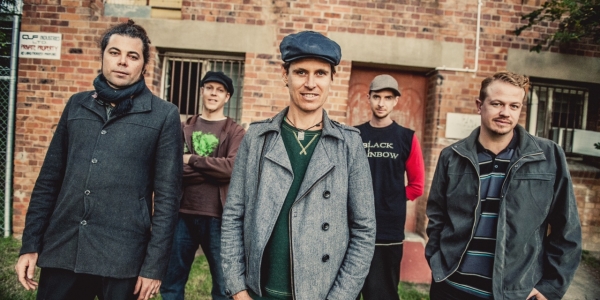Brisbane five-piece Kingfisha are quickly becoming one of the country’s leading reggae/dub acts. However, drummer Dave Bell explains that when the band started out in 2008 there was already a major reggae movement in motion in their hometown. “There’s always been a really tight crew of players and an audience-base who are really interested in this style of music in Brisbane. I think it’s been going on for at least 10 years, which is my length of involvement in the scene.”
Bell believes that Kingfisha shows are representative of the reggae subculture and thus have a slightly different atmosphere than what you’d see at trend-focused gigs. “Usually our crowds are a little more on the hippy side of things. There’s a lot of weed smoking going on, which is another way to define the crew that is involved in this side of things.”
Kingfisha have been showing up on plenty of festival lineups over the last few years and Bell indicates that they’re well suited to the festival stage. “That’s mostly what we’ve been doing lately. We did Bluesfest two years ago and that went really well and gave us a lot of confidence that we could get on bigger stages and still be successful in front of big crowds.”
One of the best things about the life of a touring musician is the diverse range of environments you’re regularly led to. Bell suggests that while musicians often face financial drawbacks, these are cancelled out by the vocational benefits.
“Travel’s awesome, we’re really lucky. Because you make so little money doing this job, it’s one of the things that makes it worthwhile.” In addition to appearing at Bluesfest, the band also just played the highly esteemed WOMADelaide festival. Bell discloses another alluring location they’ll soon be returning to.
“We’re doing Wide Open Spaces out near Alice Springs in a couple of months. It’s wicked out there. Last time we were out there in the desert it had just rained heaps so it was completely in bloom. We got to go to some waterholes and go swimming. It was a really special time.”
Kingfisha have consistently toured Australia during their five-year history but as yet they’ve made just one overseas trip, for a successful tour of New Zealand. However, Bell refers to their promising intentions to remedy this fact in 2013. “We did AWME in Melbourne last year and got some leads out of that to do some festivals in Europe. We’re trying to gee that up for the back-end of this year. So, fingers crossed.”
The band are just about to head out on tour in support Digging For Fire, the final single taken from last year’s self-titled debut album. The album was assembled of songs accumulated during the first few years of the band’s development, but Bell confirms they’re not struggling to amass material for the next release. “We’re writing heaps at the moment, which is a bit rare for us actually. Usually we’re really slow to bring along new material but the last six months we’ve gotten a bunch of new tunes on the go.”
Matching the success of their debut album could be a daunting prospect. However, Bell reveals that rather than sticking to the precedent established by the first record they’re modifying their stylistic outlook and pushing beyond the obvious conventions of reggae music.
“We’re trying to move away from the clichés of reggae in some ways. We’re experimenting with not using a skank in a song, for example. We’re definitely using more synths. I’m using a sample pad when I’m playing drums and we’re starting to involve our bass player in using a bass synth. Plus, we’ve already got two other synths happening. Just trying to tweak the sound a little bit so it’s more our own.”
Kingfisha are signed to local Brisbane label, Vital Signs Records. Bell details the band’s harmonious entwinement with the label, which ensures they aren’t pressured to satisfy unreasonable label demands.
“One of the label owners is part of Kingfisha. It’s basically just a couple of dudes from the roots scene getting together and wanting to put out music and have some fun and promote the music that they like.”
Bell agrees that it’s important for bands operating in the contemporary music industry to have a versatile aptitude when it comes to managing band affairs.
“I think it’s the way of the future, unless you’re with the big record labels who do that stuff for you, but that seems to be really rare these days. It’s also being part of a creative business. If you want to get ahead then you’ve got to wear all of those hats and try to bring creativity to everything that you do that’s part of the business.”
BY AUGUSTUS WELBY

